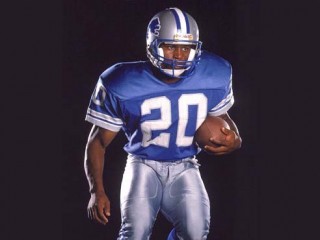
Barry Sanders biography
Date of birth : 1968-07-16
Date of death : -
Birthplace : Wicheta, Kansas, U.S.
Nationality : American
Category : Sports
Last modified : 2010-07-15
Credited as : Football player , played for Oklahoma State University,
10 votes so far
To describe Barry Sanders running the football is to define elusiveness. During his ten NFL seasons with the Detroit Lions, he probably caused more missed tackles than any running back in history. Sanders’ powerful legs, superb balance, low center of gravity, and lightning reflexes enabled him to stop on a dime, change directions in an instant, and leave defenders grasping at air.
Born July 16, 1968, in Wicheta, Kansas, Barry Sanders didn’t even play running back in high school until the fourth game of this senior year. He went on to rush for 1,322 yards in his final seven games, earning all-state honors. However, he received only a handful of college scholarship offers, including one from Oklahoma State University, which he accepted.
BURSTING ON THE SCENE AT OKLAHOMA STATE
Laboring patiently behind established star, and fellow future hall of famer, Thurman Thomas, Barry didn’t become the Oklahoma State Cowboys’ starting tailback until his junior year, after Thomas graduated. As was true in high school, however, he quickly made up for lost time. Barry notched four 300 yard games en route to an NCAA single season rushing record of 2,628 yards. Over the season, he led the nation by rushing for over 200 yards per game and averaging 7.6 yards per carry. He scored 39 touchdowns, 37 on the ground, which was also an NCAA record. In November of that year, in recognition of his accomplishments, Barry was awarded the Heisman Trophy.
ROARING INTO THE NFL
In 1989, although he had a year of college eligibility left, Barry opted to enter the NFL Draft, and was selected in the first round by the Detroit Lions, as the third overall pick. In his first season, Barry Sanders ran for over 1,000 yards and finished second in the NFL in yards gained and touchdowns scored. For his efforts, the 5’8” phenomenon was named NFL Rookie of the Year.
It was the start of ten consecutive seasons in which Barry eclipsed the 1,000 yard rushing mark. Never one for splashy post-play celebrations or spiking the ball after a touchdown, Barry let his performance speak for itself. In game after game, season after season, Barry Sanders was a true human highlight reel. He did more than gain yards, he outright dazzled defenders on a regular basis and gave defensive coordinators fits. He was a threat to explode for big yardage on any given play and to do so with a signature flair that kept the crowd on the edge of their seats.
In 1994, Barry averaged 5.7 yards per carry and tallied 1,883 yards rushing. He added another 283 yards receiving, to top 2,000 total yards from scrimmage on the season. His efforts earned him the NFL Offensive Player of the Year Award.
MVP HONORS AND A MAJOR DECISION
Barry ran for more than 1,500 yards for three more seasons in a row, peaking in 1997 with 2,053 yards, joining O.J. Simpson and Eric Dickerson as the only players in NFL history to surpass the 2,000 yard rushing mark in a single season. For this monumental accomplishment, Barry was recognized, along with the Packers’ Brett Favre, as the NFL’s Most Valuable Player.
Despite his individual feats and the many well deserved accolades they garnered, a Super Bowl championship proved elusive to Barry and the Detroit Lions. In 1991, a 12-4 Lions squad defeated the Dallas Cowboys in the divisional playoffs, but lost in the NFC Championship Game to the Washington Redskins. And the Lions lost their four other playoff appearances during Barry’s tenure.
Perhaps it was this lack of overall team success that contributed to Barry’s stunning announcement after the 1998 season that he would not return to football. In that, his final year, he had rushed for 1,491 yards, demonstrating that he was still at or near the peak of his powers. Whatever his reasons, Barry decided to move on, and the loss to millions of fans who loved him for the sheer excitement he brought to the gridiron was keenly felt.
A RECORD BREAKING LEGACY OF EXCITEMENT
In just ten years in the NFL, Barry Sanders had gained 15,269 rushing yards, 2,921 receiving yards, 118 kickoff return yards, and 109 touchdowns (99 rushing, 10 receiving). He retired less than 1,500 yards short of Walter Payton’s then-record career total of 16,726 yards rushing. He remains third on the all-time rushing list behind only Payton and current leader, Emmitt Smith. He ranks fourth on the all-time list for career total yards from scrimmage with 18,190.
He was the first player to gain 1,500 yards or more in five seasons and is the only one to do so in four consecutive seasons, 1994-97. He rushed for an NFL record 15 touchdowns of 50 yards or more. He finished with an NFL record 25 games in which he gained 150 yards or more. Barry had 14 consecutive 100 yard rushing games in 1997 and ran the ball a remarkable 803 times without a fumble. He led the league in rushing four times, 1990, 1994, 1996, and 1997.
Barry was named to the Pro Bowl every year he was in the league and was voted first-team All-Pro eight times. He was inducted into the Pro Football Hall of Fame in August of 2004. Later that year, on Thanksgiving Day, the Detroit Lions retired his number, 20.Then, as now, it was clear to NFL fans everywhere there would never be another Barry Sanders.
















